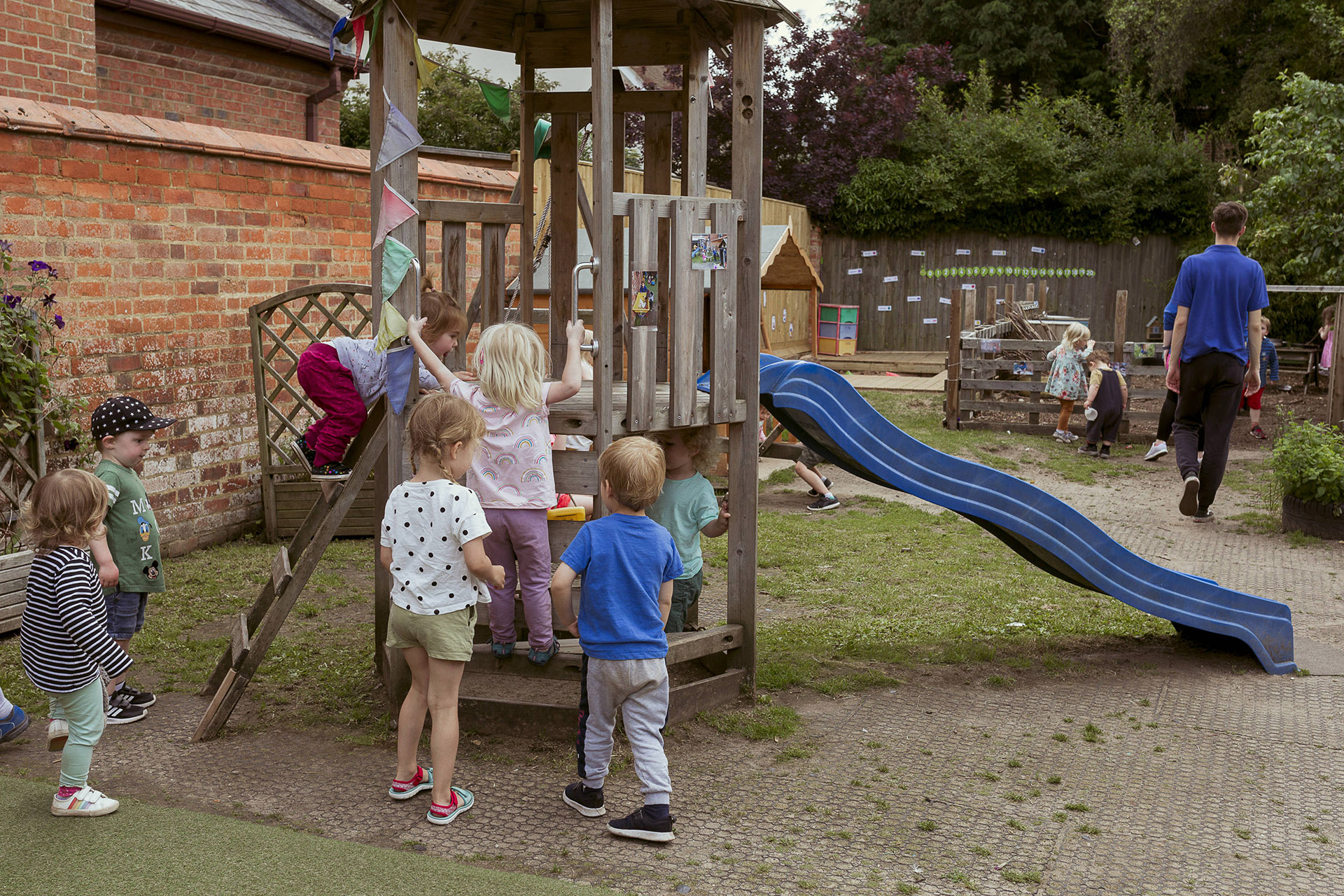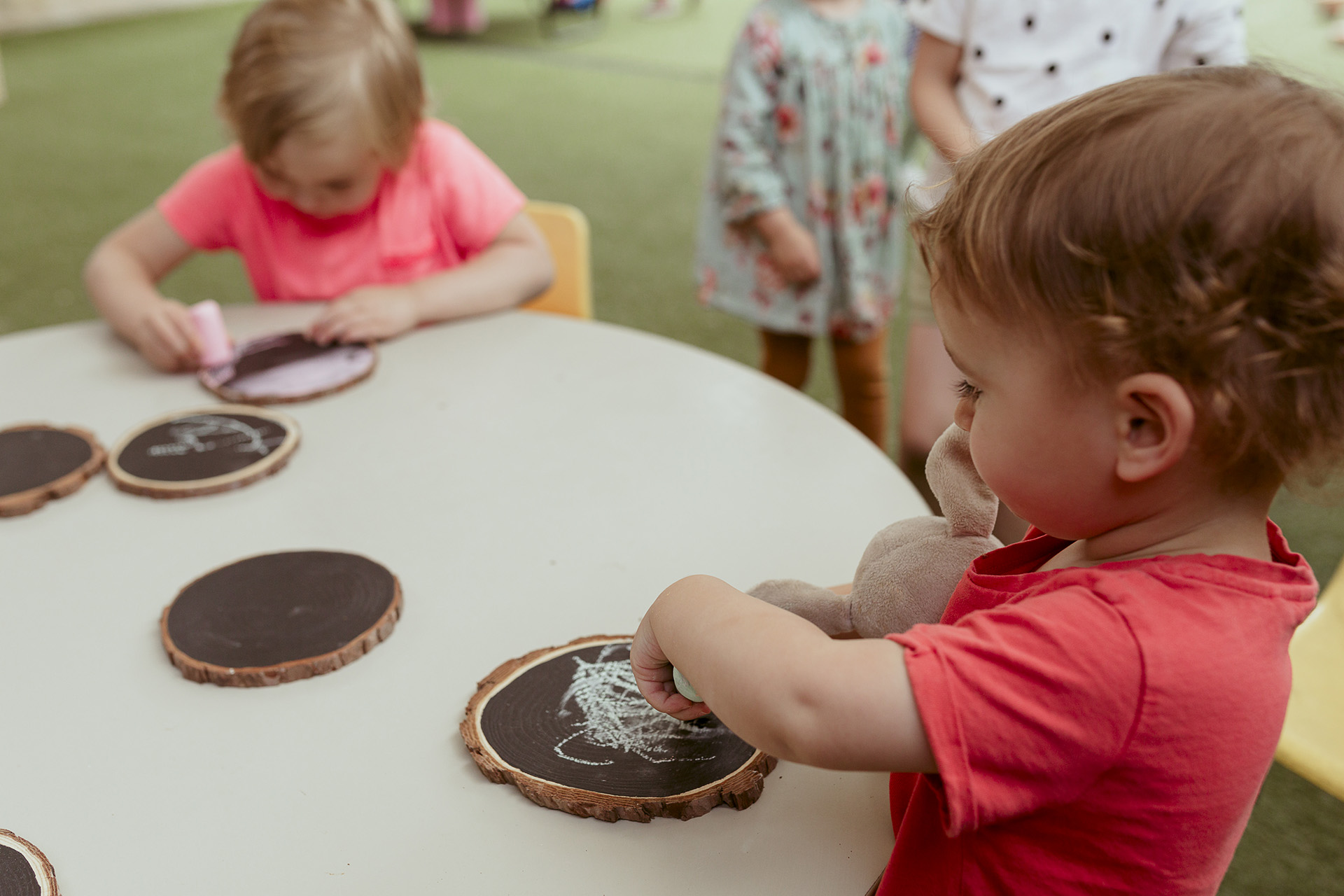Carefully planned play for every stage
The baby room
Young babies are learning to develop physical skills such as grasping, holding, rolling and sitting up for crawling. Through well-planned play, careful use of resources and loving encouragement they develop their coordination and learn how to grasp toys, stack cups and knock them down, sit up, crawl and explore in a safe environment with lots of different stimulation each day, ranging from song time to messy play and rummaging for interesting items to feel and chew on in treasure baskets.
Caring adults will quickly develop bonds with your baby. When you first come to the nursery for your settling-in session your baby will have the opportunity to play with and get to know our team and we will choose a key person based on who your baby has the strongest connection with. Your key person will get to know your baby really well and will spend the most time with your baby. They will feed back to you each day and through our understanding of care routines, well-planned play and cuddle time, this relationship propels your baby forward in their development.
Young babies language is developed through the adults' constant monologue of the day describing the world around them and helping babies identify and name their environment. Story time, smiling and laughing, talking, tickling and singing are all part of the day. Quickly babies start to imitate the sounds of familiar songs, babbling along with music or imitating actions which usually accompany a large grin or mesmerised stare as they enjoy the familiarity and recognition of the song.
Our babies spend time outside every day enjoying the sounds and sights of our baby garden full of exciting things to explore in a very safe and well-planned space. We encourage the smaller babies to be inquisitive by hiding familiar toys in sand or shredded paper for them to discover. We love to get our babies messy and stimulate their senses by offering them different textures and smells to explore such as banana custard and of course plenty of warm bubbly water play.
As your baby gets mobile, we encourage their progression from rolling to crawling and then ensure they have plenty of safe places to practice cruising around the furniture or using wheeled toys for support. Once they start taking their first steps we build their confidence in walking and selecting toys themselves through encouragement, a hand to grab onto when needed and access to a large variety of resources.
The tweenie room
Around 18-24 months, our babies progress up to our Tweenies room. By now your child will be walking and more interested in playing for longer periods. The tweenies are encouraged to learn how to play alongside and with each other as social skills are an important step in their development. Our large room is carefully planned to encourage children to explore resources and toys together. Activities are planned to encourage and facilitate making friends; improve coordination and develop some independence.
Our tweenies will start to enjoy more structured play and so now we offer a wider range of activities both indoors and outdoors such as painting; exploring malleable materials like clay; fine motor activities like threading; gross motor activities like obstacle courses; stories and books; music and role-play; and problem solving puzzles and games.
The tweenies’ day is more structured now but children are allowed to choose where and how their learning will take place. Many children are toilet training at this stage and the team will work with them and you to achieve this as easily as possible. Children who still need a lunchtime nap are able to continue to do so and for those who dont need a nap we enjoy a low key quiet play time cuddled up on cushions with books and teddies in the cosy corner.
Our activities are all based on planning led by the EYFS Development Maatters curriculum. Planning for the Tweenies is found on the notice board inside the room and is individualised, reflecting the different children in the room and encourages learning, playing skills, confidence and independence.
Preschool
Preschool work together to successfully scaffold the learning for children around age three to school age. The team coordinate lessons and planning to ensure children are making appropriate progress.
Children aged 3 and 4 are constantly encountering new experiences which they try to understand. As they do so they explore the world around them, ask questions, extend their skills, develop their confidence and build on what they already know. Our aim is to ensure we maximise their opportunities to extend their learning and skills and prepare them for school. During their time in our preschool rooms the children will develop through a number of activities which we do regularly to prepare the children for big school such as helping them to recognise and write their own name, and familiarising them with basic maths and phonic knowledge. In lower preschool children are supported in their learning until they are ready to be successful independent learners and are able to move to upper preschool where the focus is on preparing them for the structure and independence needed to enable a smooth transition to school.
Well planned play is central to children’s learning in these classrooms, this way learning is both challenging and fun. We develop long term plans to deliver the curriculum as well as weekly plans based around the children’s current interests and developmental journeys. You can see all the planning on display outside the preschool rooms.
In Preschool we deliver the EYFS curriculum and the quality of our education is inspected by OFSTED in the same way as a school.


